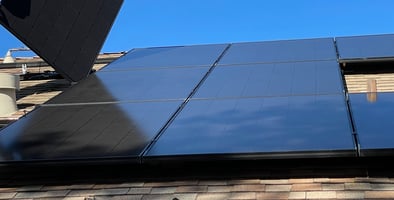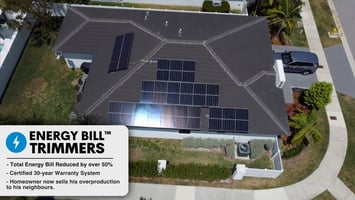The adoption of solar energy has grown exponentially in recent years, offering a sustainable and...
Solar Leases in Florida: Pros and Cons
Homeowners considering the switch to solar energy have several options at their disposal, ranging from cash purchases and solar loans to the increasingly popular solar leasing. In this article, we'll delve into the world of solar leasing, exploring what it entails, its pros and cons, and how it stacks up against other financing methods. So, if you're curious about whether solar leasing is the right choice for you, read on!
How Does Leasing Solar Panels Work?
So, what exactly is solar leasing? Well, it's a straightforward concept. With solar leasing, you essentially rent solar panels from a solar company, paying them a monthly fee to use the panels without owning the equipment outright. Here's a breakdown:
- The solar company handles the installation of the panels and takes care of ongoing maintenance. This is the key element. They are responsible for it, just as when you lease a car.
- In return, you sign a contract to lease the panels for a specific period, typically spanning 15 to 25 years, and make monthly payments during that timeframe.
Solar leasing is an appealing option if you can't afford the hefty upfront cost of purchasing solar panels. The idea is that your monthly savings on your electricity bill will outweigh the cost of the lease, ultimately putting more money back in your pocket. However, it might not be the best choice if your monthly lease payments are equal to or higher than your utility bill savings.

Leasing has been on the rise in Florida, over the past years.
While this arrangement presents several advantages, it also comes with its fair share of disadvantages. In this article, we will explore the pros and cons of solar leasing in greater detail, accompanied by mathematical examples to illustrate each point.
Pros of Solar Leasing
Let's jump into the most important key points:
1. No Upfront Cost
Pro: Solar leases typically require no upfront payment from the homeowner, making solar energy accessible to a broader range of individuals. This lack of initial investment is a significant relief for homeowners who may not have the financial means to purchase and install a solar panel system outright. By opting for a solar lease, individuals can start benefiting from solar energy without depleting their savings or taking out a hefty loan.
Example: Imagine you want to install a solar panel system that costs $15,000. With a solar lease, you avoid this initial expense. Instead, you pay a monthly lease fee, which is often significantly lower than the cost of purchasing the system outright. Let's say your monthly lease payment is $100. Over a 25-year lease, this amounts to $30,000, still less than the upfront cost of buying the system.
2. Lower Monthly Energy Bills
Pro: Solar panels can generate a substantial amount of electricity, reducing your reliance on the grid and leading to substantial savings on energy bills. This reduction in monthly expenses can free up funds for other essential expenses or savings, providing homeowners with financial relief.
Example: Let's say your average monthly electricity bill is $200. After installing solar panels through a lease, your bill might drop to $50 per month, saving you $150 monthly. Over the course of a year, this equates to $1,800 in savings. Over the 25-year lease term, your cumulative savings could reach $45,000 or more, depending on factors such as energy rate increases and system efficiency.
3. Professional Installation and Maintenance
Pro: Solar companies are responsible for installing and maintaining the solar panels, saving homeowners time and effort. Their expertise ensures that the panels are optimally placed and functioning correctly, maximizing energy production.
Example: Solar panel maintenance can cost approximately $150 to $200 annually. With a solar lease, you won't incur these costs over the duration of the lease, which can be 20-25 years. Moreover, the professional installation ensures that your solar panels are set up to capture the maximum amount of sunlight, increasing your energy generation potential and, subsequently, your savings.
4. Environmental Benefits
Pro: Solar energy is clean and renewable, helping to reduce your carbon footprint and contribute to environmental protection. By choosing solar leasing, you actively participate in the transition to sustainable energy sources.
Example: The average American household generates approximately 7.5 metric tons of CO2 emissions annually through electricity consumption. By using solar panels, you can significantly reduce these emissions, aiding in environmental preservation. Over the course of a 25-year lease, you can prevent the release of nearly 200 metric tons of CO2, making a substantial positive impact on the environment.
Cons of Solar Leasing
Cons, for sure there are, as with any other thing in life:
1. Long-Term Commitment
Con: Solar leases often require homeowners to commit to a contract lasting 20-25 years, limiting their flexibility. While this commitment provides stability, it can also pose challenges if your circumstances change.
Example: If you decide to move after 10 years into your solar lease, you may face penalties for breaking the contract, which can amount to thousands of dollars. These penalties can significantly offset the financial benefits you've gained from the lease, making it important to carefully consider your long-term plans before entering into such an agreement.
2. Limited Ownership
Con: At the end of the lease term, you may have the option to purchase the solar panels at a discounted price. However, if you choose not to exercise this option, you'll need to have the panels removed at your own expense, as they technically still belong to the leasing company.
Example: If you don't buy the panels, you could face removal costs of around $2,000 to $3,000. This cost should be factored into your decision-making process, as it affects the overall financial outcome of the lease arrangement.
3. Limited Flexibility
Con: Making changes to your roof or relocating may require permission from the solar company, limiting your ability to modify your property. This lack of flexibility can be frustrating for homeowners who want to renovate or adapt their homes to changing needs.
Example: Modifying your roof without permission can void your lease agreement, potentially leading to legal consequences. This means that even home improvements unrelated to the solar panels must be carefully considered and coordinated with the leasing company, adding a layer of complexity to your homeownership experience.
Other Solar Financing Options
If solar leasing doesn't tick all your boxes, fear not, there are other financing options:
1. Cash Purchase: If you've got the funds, paying for your solar system upfront is an attractive choice. You'll own the system immediately and can enjoy the highest long-term savings.
2. Solar Loans: These loans cover the upfront costs, allowing you to pay over time. If you secure a low-interest rate, your monthly loan payment can be lower than a lease, and you get to claim any cash rebates and tax benefits.
3. Power Purchase Agreement (PPA): Similar to a lease, a PPA involves monthly payments to a provider for using solar panels. However, the key difference is that your payments depend on the electricity your panels generate, which can lead to variable costs.
At EnergyBillTrimmers, we have been doing leases for Florida homeowners since 2020, accounting for hundreds of happy Floridians who found it to be the best alternative to go solar. Either any of the three financing options, we will help you set up the best affordable solution for your wallet and your home value.



